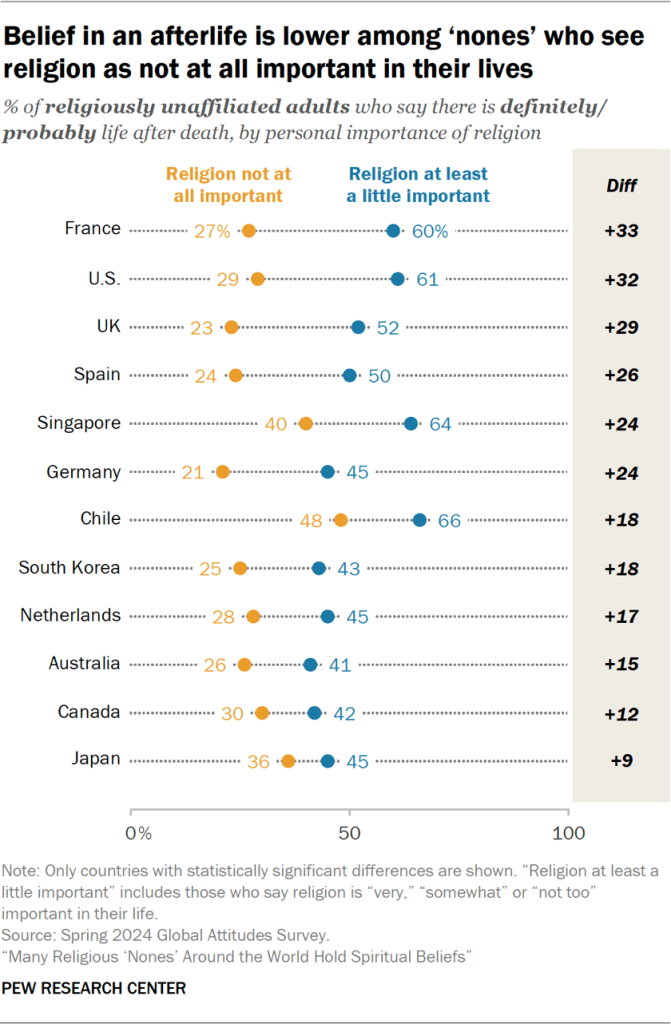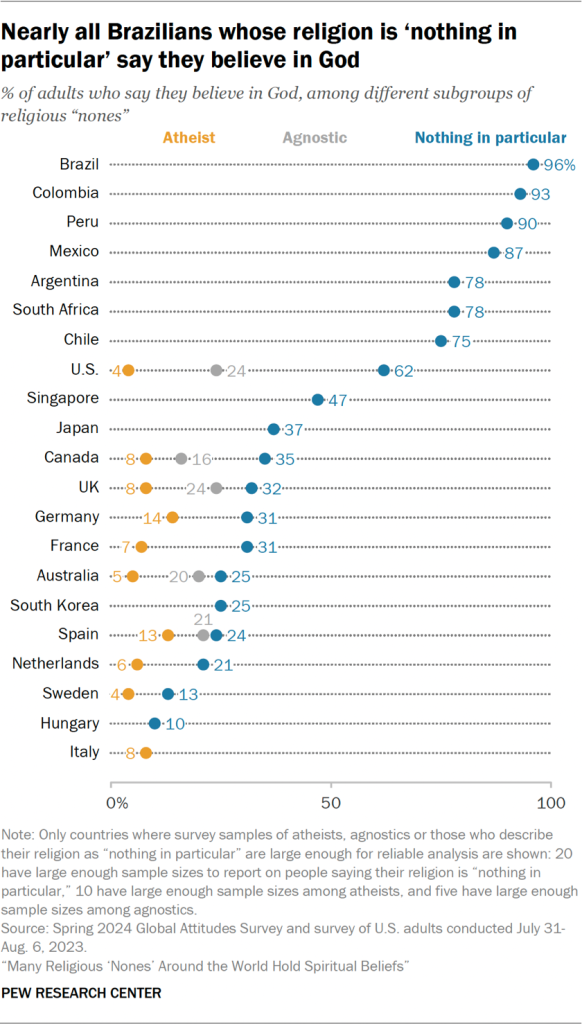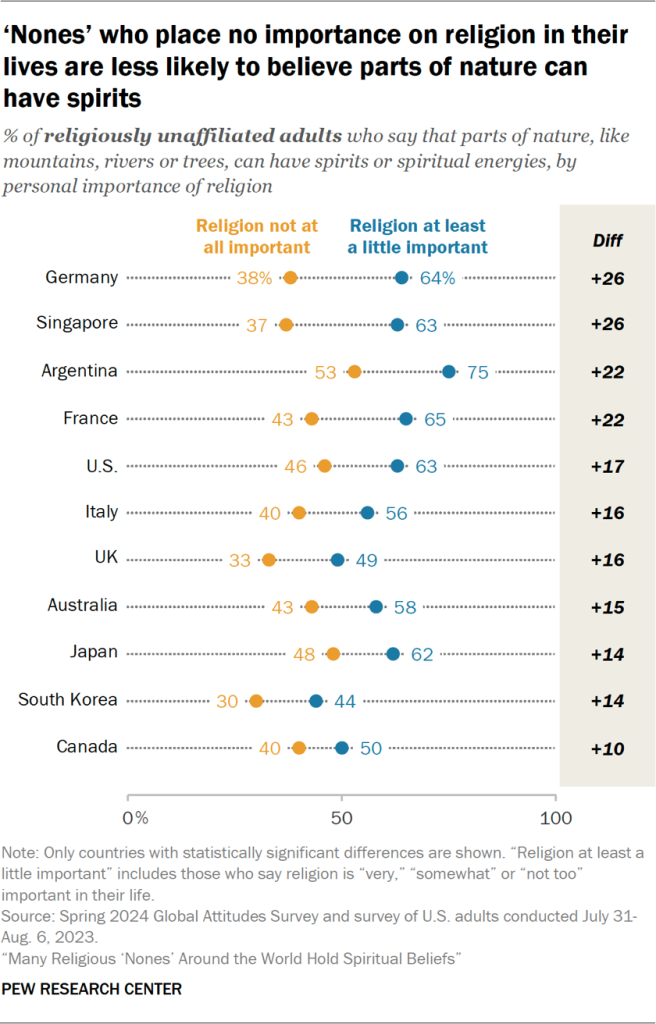What are religious ‘nones’?
“Nones” are adults who describe themselves religiously as atheist, agnostic or “nothing in particular.” This report uses the terms “nones” and “religiously unaffiliated” interchangeably.
Many “nones” express a variety of religious or spiritual beliefs. For example, in many of the 22 countries analyzed by Pew Research Center in this report, sizable shares of “nones” say they believe that something spiritual exists beyond the natural world, and that animals and parts of nature can have spirits or spiritual energies.

Belief in an afterlife is also relatively widespread among religiously unaffiliated adults in the countries included in the study.
Additionally, in a few countries, majorities of “nones” believe in spells, curses or other magic. And roughly a quarter or more of religiously unaffiliated adults in most of the countries discussed in this report believe that the spirits of ancestors can help or harm them. In one country – South Africa – 81% of “nones” express belief in the power of ancestral spirits.
In general, religiously unaffiliated people around the world are less likely to hold religious and spiritual beliefs than are people in the same countries who identify with a religion.
For example, “nones” are less likely to believe in God than people who identify with a religion in each of the 22 countries where our survey included enough “nones” for reliable analysis. In Italy, for instance, 16% of “nones” believe in God, compared with 91% of religiously affiliated adults – a difference of 75 percentage points.10

The differences persist, but are smaller, in countries such as Argentina, where most “nones” (62%) and even higher shares of the religiously affiliated (99%) believe in God.
Similar patterns prevail on other beliefs the survey measured.
Within the broad category of “nones,” people who identify as atheists generally are less likely than people who describe their religion as “nothing in particular” to hold some spiritual and religious beliefs.11 For example, in Australia, 14% of atheists say there is life after death, while 37% of people who say their religion is “nothing in particular” believe in an afterlife.12
Self-described agnostics sometimes are similar to atheists and sometimes differ from them on the wide range of beliefs discussed in this report. We have enough agnostics in our survey samples to provide detailed analyses of their views in only five of the 22 countries surveyed. For country-by-country survey results among agnostics, atheists and people who identify religiously as “nothing in particular,” go to the report topline.
Within a country’s population of “nones,” there are often wide gaps in belief between two other subgroups: those who say religion is not at all important in their lives, and those who attribute even a little (or more) personal importance to religion.

For example, “nones” who view religion as not at all important are much less likely than other “nones” to say there is definitely or probably an afterlife.13
The survey findings also indicate that women who are “nones” generally are more likely than men who are “nones” to express a variety of beliefs. Among “nones” in Singapore, for instance, women are about twice as likely as men to believe that spirits can inhabit objects such as crystals, jewels or stones (45% vs. 21%). This pattern is consistent with our previous studies showing that women tend to be more religious than men in many countries, particularly within Christian populations.
(The religious and spiritual beliefs of “nones” are also discussed in this report’s Overview.)
Jump to sections on: Belief in God | Belief in ancestral spirits |
Belief in other kinds of spirits | How the beliefs of ‘nones’ vary by gender
Belief in God
In most of the 22 countries analyzed, at least one-in-five religious “nones” say they believe in God.
However, among “nones” who describe their religious identity as “nothing in particular,” the share expressing belief in God varies widely by country. For example, people in the “nothing in particular” category in Latin American countries are a lot more likely than those in European countries to believe in God.

One possible explanation for these regional differences is that belief in God is more widespread throughout the general populations (including among religiously affiliated adults) in Latin American countries than in European ones.
For instance, nearly universal shares of Christians in all six Latin American countries surveyed express belief in God. Smaller majorities of Christians (about three-quarters) express belief in God in France, Germany and Hungary, while in Sweden, just 58% of self-identified Christians say they believe in God.
In general, across the countries with survey samples large enough to enable comparisons between atheists and people who say their religion is “nothing in particular,” atheists are less likely than the “nothing in particular” group to believe in God. For example, in the United Kingdom, 8% of atheists express belief in God, compared with 32% of adults who identify with no particular religion.
(Even though atheism is commonly understood to mean not believing in God, small shares of respondents in many places say they are atheists in answer to a religious identification question, yet they say they believe in God or affirm other religious or spiritual beliefs in response to other questions. Some scholars of religion argue that inconsistency or “incongruence” actually is the norm, not the exception, when one looks deeply into the religious identities, beliefs and practices of people around the world.)
Belief in ancestral spirits
In most of the countries analyzed in this report, about 20% to 40% of religiously unaffiliated adults believe that the spirits of ancestors can help or harm them. This includes 36% of “nones” in France, 31% in Canada and 25% in South Korea. Only in South Africa do a majority of “nones” (81%) believe ancestral spirits can affect them.

In general, “nones” who say religion is not at all important in their lives are much less likely than other “nones” to believe that ancestral spirits can help or harm them. For example, in France, 27% of “nones” who say religion is not at all important to them believe in the active role of ancestral spirits, compared with 57% of other “nones.”
Self-identified atheists are generally less likely than people who describe their religion as “nothing in particular” to believe in the power of ancestral spirits. In the Netherlands, for instance, 14% of atheists say the spirits of ancestors can help or hurt them, while 27% of adults in the “nothing in particular” category express the same belief.
Belief in other kinds of spirits
We also asked survey respondents whether they think spirits or spiritual energies are present in parts of nature (such as mountains, rivers or trees), in certain objects (such as crystals, jewels or stones), or in animals.
In most of the 22 countries discussed in this report, half or more of “nones” say animals have spirits or spiritual energies.
And in most of these countries, sizable shares also believe that parts of nature can have spirits, though the shares range widely, from 80% of Chilean “nones” to 28% of Hungarian and Swedish “nones.”
Much lower percentages of “nones” believe that certain objects can have spiritual energies.
In a now-familiar pattern, “nones” who say religion is not at all important in their lives are less likely than other “nones” to believe that mountains, rivers or trees can have spirits. In Germany, for instance, 38% of “nones” who place no importance on religion hold this belief, compared with 64% of “nones” who say religion has at least a little importance in their lives.

How the beliefs of ‘nones’ vary by gender
Among religiously unaffiliated adults, women are generally more likely than men to hold most of the religious and spiritual beliefs asked about in the survey.

This gender gap occurs in more than a dozen countries on the question of whether parts of nature can have spirits or spiritual energies. In Australia, for example, 60% of women who are “nones” believe this, compared with 31% of “nones” who are men.
Similarly, among “nones,” women typically are more likely than men to believe in reincarnation – defined in the survey as the belief that “people will be reborn in this world again and again.” For instance, unaffiliated women in South Korea are about twice as likely as unaffiliated men to believe in reincarnation (36% vs. 16%).
However, unaffiliated women are more likely than unaffiliated men to believe in God in only four of the 15 countries with sufficient sample sizes to analyze differences by gender. And among Swedish “nones,” men are somewhat more likely than women to express belief (13% vs. 6%).
There aren’t many substantial differences on these questions by age or education. For example, the beliefs of “nones” ages 18 to 39 are typically quite similar to those of “nones” ages 40 and older. That said, on a few questions in this survey, younger religiously unaffiliated adults are somewhat more likely than older “nones” to believe. In Canada, for example, 62% of younger “nones” believe that animals can have spirits, compared with half of older “nones.”
And while “nones” in the United States with at least an associate degree are somewhat less likely than U.S. “nones” with less education to hold most of the beliefs in this survey, this general pattern does not meaningfully extend across the other countries analyzed.




